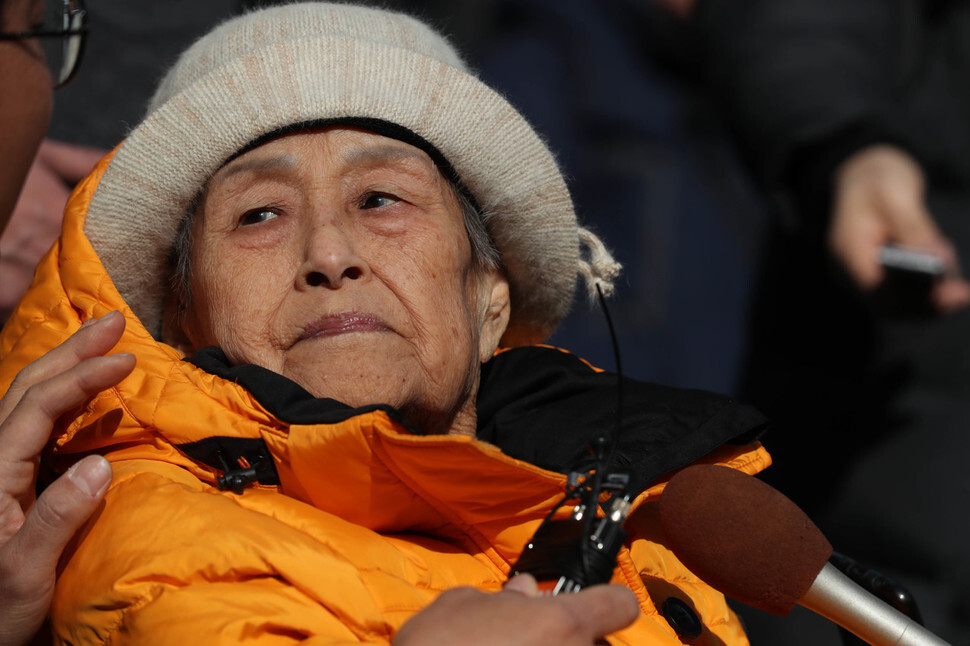hankyoreh
Links to other country sites 다른 나라 사이트 링크
S. Korean court orders Nachi-Fujikoshi to compensate forced labor victim

“The Japanese government needs to reflect on its actions. It shouldn’t be so unprincipled. It needs to repent for its past mistakes, show remorse and ask for forgiveness. It can’t just ignore us,” said Lee Chun-myeon, 87, who was drafted as a forced laborer for Nachi-Fujikoshi, a Japanese company that committed war crimes during World War II. Lee was responding to Japanese reporters who asked her on Jan. 23 what she wanted to say to the Japanese government, which had instructed the company not to pay compensation. Lee also urged the South Korean government to thoroughly investigate how Japan had treated members of the Korean Women’s Volunteer Labor Corps.
On Wednesday, the 11th civil appeals division at Seoul Central District Court, under Hon. Park Mi-ri, upheld a lower court’s decision in Lee’s damages lawsuit against Nachi-Fujikoshi and ordered the company to pay Lee 100 million won (US$88,685). Lee filed her lawsuit in May 2015, asking to be compensated for the mental, physical and economic damage caused by the company’s crimes against humanity, including forced labor. In Mar. 2017, a district court ordered that she receive some of the requested damages, but the appeal moved forward slowly. It wasn’t until the Supreme Court conclusively ruled in Oct. 2018 that victims of forced labor during Japan’ colonial occupation are owed compensation that Lee’s appeal picked up speed.
After the appeals court issued its verdict, Lee emerged from the courthouse in a wheelchair and met reporters. “I volunteered for the Korean Women’s Volunteer Labor Corps because I believed my Japanese school principal when he told me that if I went to Japan I could go to middle school and even university. I had to do between ten and twelve hours of forced labor every day at the Fujikoshi factory. Some of the workers starved to death and others lost their minds and called for their mothers and fathers as they lay dying,” Lee said, dredging up painful memories.
Nachi-Fujikoshi has reportedly rejected the ruling and plans to appeal the case.
By Jang Yee-ji, staff reporter
Please direct comments or questions to [english@hani.co.kr]

Editorial・opinion
![[Guest essay] Amending the Constitution is Yoon’s key to leaving office in public’s good graces [Guest essay] Amending the Constitution is Yoon’s key to leaving office in public’s good graces](https://flexible.img.hani.co.kr/flexible/normal/500/300/imgdb/original/2024/0416/8917132552387962.jpg) [Guest essay] Amending the Constitution is Yoon’s key to leaving office in public’s good graces
[Guest essay] Amending the Constitution is Yoon’s key to leaving office in public’s good graces![[Editorial] 10 years on, lessons of Sewol tragedy must never be forgotten [Editorial] 10 years on, lessons of Sewol tragedy must never be forgotten](https://flexible.img.hani.co.kr/flexible/normal/500/300/imgdb/original/2024/0416/8317132536568958.jpg) [Editorial] 10 years on, lessons of Sewol tragedy must never be forgotten
[Editorial] 10 years on, lessons of Sewol tragedy must never be forgotten- [Column] A death blow to Korea’s prosecutor politics
- [Correspondent’s column] The US and the end of Japanese pacifism
- [Guest essay] How Korea turned its trainee doctors into monsters
- [Guest essay] As someone who helped forge Seoul-Moscow ties, their status today troubles me
- [Editorial] Koreans sent a loud and clear message to Yoon
- [Column] In Korea’s midterm elections, it’s time for accountability
- [Guest essay] At only 26, I’ve seen 4 wars in my home of Gaza
- [Column] Syngman Rhee’s bloody legacy in Jeju
Most viewed articles
- 1Faith in the power of memory: Why these teens carry yellow ribbons for Sewol
- 2[Guest essay] Amending the Constitution is Yoon’s key to leaving office in public’s good graces
- 3[Editorial] 10 years on, lessons of Sewol tragedy must never be forgotten
- 4[Guest essay] How Korea turned its trainee doctors into monsters
- 5Korea ranks among 10 countries going backward on coal power, report shows
- 6Final search of Sewol hull complete, with 5 victims still missing
- 7[News analysis] Watershed augmentation of US-Japan alliance to put Korea’s diplomacy to the test
- 8K-pop a major contributor to boom in physical album sales worldwide, says IFPI analyst
- 9World famous Korean instant noodle: truth and misconceptions
- 10Japan ramps up efforts to remilitarize, integrate with US to deter China